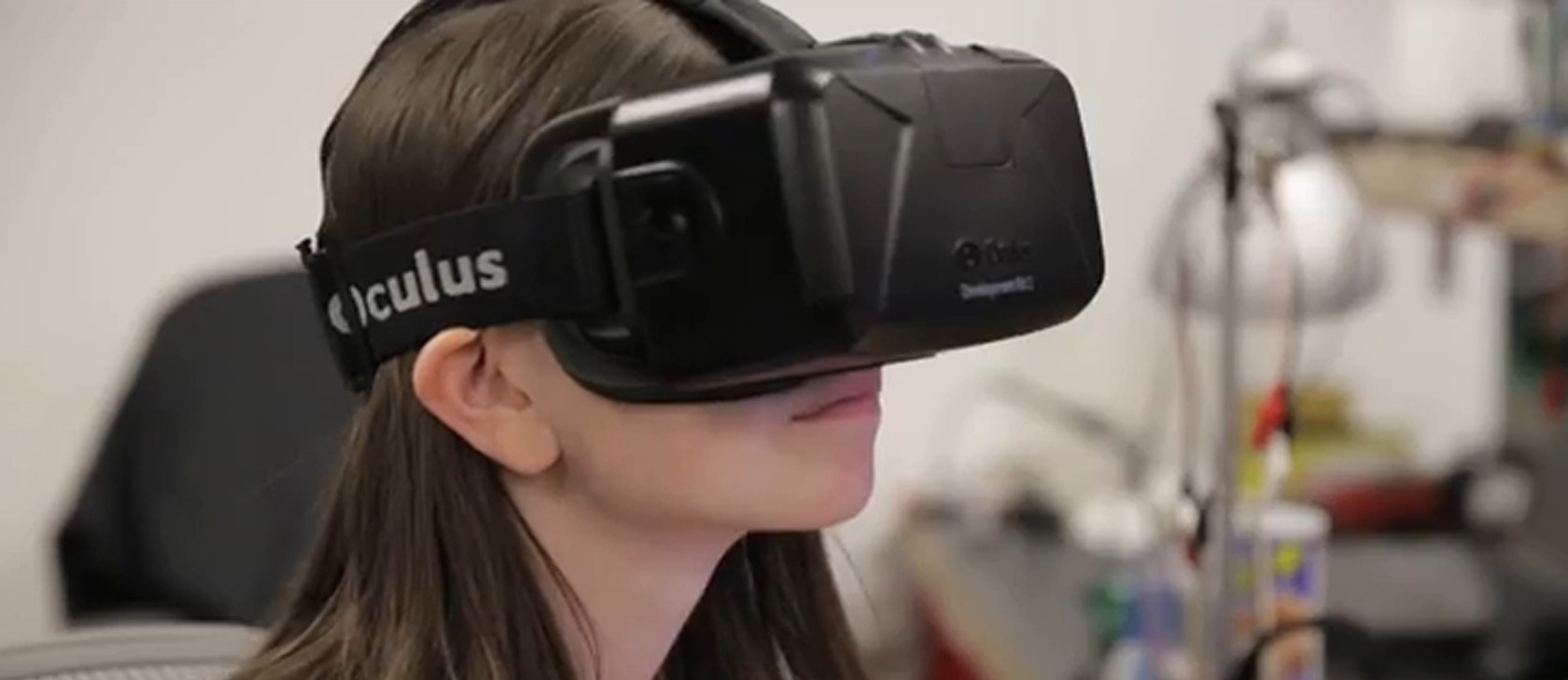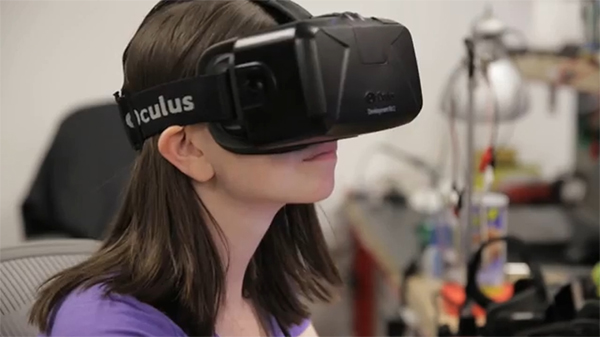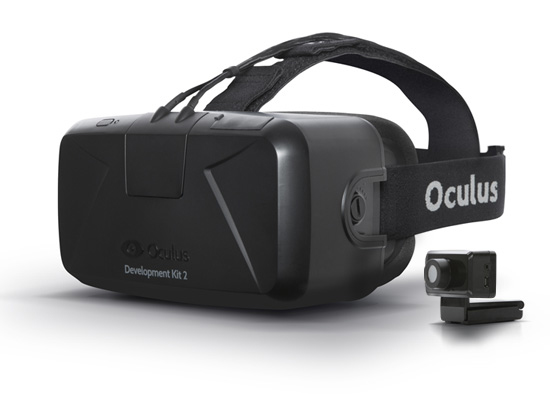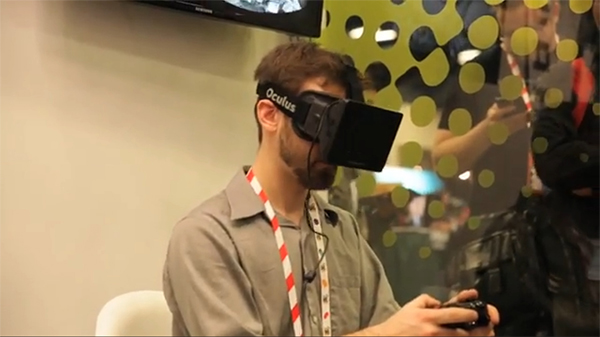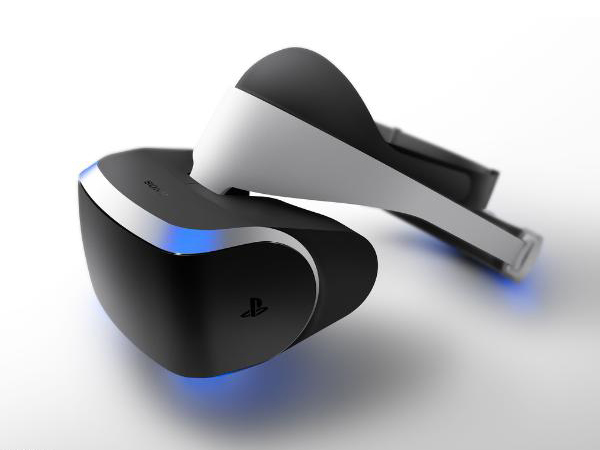With Facebook’s $2 billion acquisition of virtual realiy company Oculus VR making headlines several people have asked me to explain the story right from the begining so here you go. If you’re already familiar and simply want my thoughts, feel free to skip ahead to “Facebook Buys In”.
What Is Virtual Reality?
You can tell when you’re watching a movie. If you look around you can see the edge of the screen, the walls of the room you’re in and if you think about it, you can even sense that you’re sitting in a chair and not flying around in an airplane or running through the woods.
With today’s virtual reality it’s not that easy. There’s a headset coming to market called the Oculus Rift that uses goggles to fill your entire eyesight with 3D video. You can look around all you want, even behind you, and you will never find the edge of a screen or sense the walls of a theatre.
To make the experience even more convincing, it matches what you see and hear in the virtual world with the movements of your eyes and head. This is a new trick you haven’t seen before. It convinces your brain that what you are seeing and hearing is physically real and that the chair you’re sitting in doesn’t exist.
The effect is so convincing compared to what we’re used to that first-time users are often treated to the experience of jumping off of a cliff. Once you’re feel like you’re actually falling, you immediately understand why this is different.
The technology behind virtual reality isn’t new. There was an attempt to sell it the 1990’s and although it was quite crude, it worked well enough to prove that mass audiences had little patience for it. Once the novelty wore off most found the prospect of sitting alone with some goggles on unappealing no matter how much they may get better. This is a minority interest, a hobby, and so all the money left and the idea was abandoned.
Oculus Rift
Kickstarter changed everything. It allows projects that lack mass appeal to get financing from their minority communities. When a group of twenty-somethings in California said they needed $240,000 to bring virtual reality back and make it better, hobbyists responded by giving them $2.4 million.
The result is the Oculus Rift, a virtual reality system so convincing that legendary game designers tripped over themselves to get involved. With the prospect of Doom’s John Carmack, Gears of War’s Cliff Bleszinski, Minecraft’s Notch, and Half-Life’s Gabe Newell making virtual reality games, the Occulus Rift has become very cool, enough that the video game industry is now starting to wonder if it might just be the “next big thing” everyone’s searching for.
So much so that Sony unveiled their own virtual reality headset two weeks ago under the name Project Morpheus. It can be used with PlayStation accessories and be connected to a television so others can see what you see, but in many ways it’s similar to the Oculus Rift.
Now there are two virtual reality gaming systems coming to market and the race is on to see who can come up with the best games.
Facebook Buys In
Last week it was announced that Facebook is buying up Occulus VR, the group of twenty-somethings who started it all, for $2 billion.
The immediate reaction has been one of anger and disappointment. Hobbyists gave money to the Kickstarter project with the spirit of keeping it out of the hands of big corporations. Many feel because they were listed as “investors” they should have a say in the deal, while most are concerned that because Facebook is not a game company, is no longer “cool”, and has earned themselves a dark and controlling reputation that they may twist the fate of a technology that was starting to feel magical and special.
For the Oculus VR team, it’s about having the resources to better engineer their product so they can bring it to market at a lower price. It’s about having the freedom to develop it outside of gaming, to create simulators for the military or the medical industry. Founder Palmer Luckey took to Reddit to repeat promises from Facebook that nothing would change, that their company would be allowed to continue as before, but with better resources and support.
With Amazon investing in drones and Google investing in robots, Facebook seems eager to have their own collection of futuristic endeavors. Last week they offered the first details for their plans to bring internet access to remote areas through solar-powered planes. Virtual Reality seems to be just one of many projects the company is adopting in order to feel like it’s on the cutting edge.
In writing about the deal Mark Zuckerberg says he can see uses for the Oculus Rift outside of video games and entertainment:
“Imagine enjoying a court side seat at a game, studying in a classroom of students and teachers all over the world or consulting with a doctor face-to-face — just by putting on goggles in your home”
He’s not offering many details about his plans and so the tech world is left to speculate about his motives.
The Facebook Reality
Mark Zuckerberg is an expert in human interaction. He intuitively understands what drives people to take an interest in others. Virtual reality’s biggest issue has been the way it makes people feel isolated and socially awkward, so he may be the ideal person to solve that problem.
But I’m not sure it’s worth giving him complete control of Oculus VR just to do so.
According to founder Palmer Luckey and his colleagues at Oculus VR their biggest immediate issue is content. They have described themselves repeatedly as being “hardware guys” in need of artists who can create the kind of entertainment experiences that will make people want to buy a headset.
Mark Zuckerberg is not an expert in visual story-telling or in selling entertainment. He’s not an artist and so can’t solve that problem. Game designer Markus “Notch” Persson has already cancelled his Oculus Rift game plans, saying that “Facebook creeps me out”. Zuckerberg’s involvement might actually make it harder for the company to recruit artists. That he can’t play that central role may prove to be frustrating for him and a source of conflict in the future.
Sony’s PlayStation business will prove to be a very strong competitor, who will be offering open arms to any game designers and artists unhappy with Facebook and Occulus VR. That’s likely to be a problem.
Sony’s Project Morpheus virtual reality headset for PlayStation 4.
Palmer Luckey continues to cite promises from Facebook that they will leave the company alone. In answering questions on Reddit he responds “Facebook believes in our long term vision, and they want us to continue executing on our roadmap, not control what we do. I would never have done this deal if it meant changing our direction, and Facebook has a good track record of letting companies work independently post-acquisition.”
In the business world, things change and promises tend to go right out the window. If the right financial pressures come to bear, Facebook won’t have any issues with interfering with the company. Gaming isn’t their business and so it will be very easy for them to make decisions that favour their own interests over Oculus VR’s.
$2 billion will certainly give Palmer Luckey a lot of freedom in that they can invest in engineering without worrying about bringing in revenue right away, but it also places a large price tag on his company that will make it very difficult for him to buy the company back or attract help should he need to.
One thing’s sure, he won’t be able to go back to Kickstarter again. Hopefully the new Virtual Reality will be here to stay and give us all a magical experience to explore.

